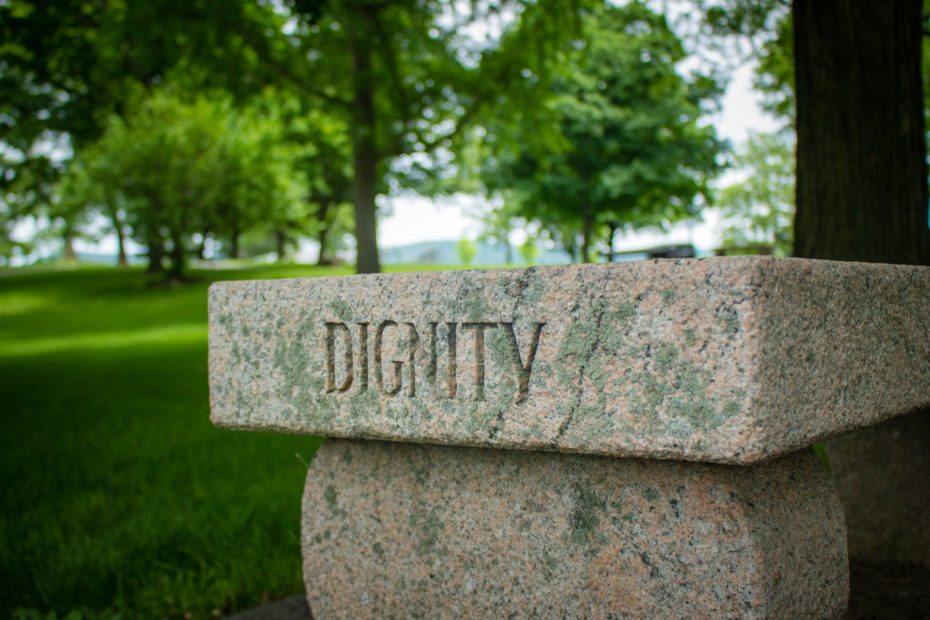George Batts MBE Leg d’Hon.
Why do we remember our war dead? Do we memorialise war or people?
It comes up every year, but in 2019, the suggestion that Remembrance Day should be abandoned is particularly important to understand and address.
I’m a republican, a left-winger and an anti-capitalist. I believe that our consumer culture is inherently self-destructive. In short, I may not be an obvious supporter of Remembrance Sunday.
God knows, our country suffers from a chronic inability to look forward and an unhealthy obsession with it’s past, which is often whitewashed and sometimes completely illusory. We’re not an Empire anymore. That’s good. Our world is a complex system. If any force in a system becomes too dominant, then everything else in the system suffers. That’s pretty much the definition of cancer.
In an article published on the 7th of November this year in The Guardian, entitled ‘Surely it’s time to lay to rest the empty, vainglorious memorialising of war’, Polly Toynbee explicitly links Remembrance to Brexit.
She says: ‘What Remembrance Sunday all too often signifies is this: “Never forget that we won two world wars”, while conveniently forgetting that victory required the greater heft of US and Russian allies. The golden age of history is always just before our own living memory, a better yesterday. That lies at the root of a Brexitism that needs to remember it was us alone against “them” across the Channel.’
Yes, Farage and Johnson like to associate themselves with Churchill. Both men were born in 1964. They’re an age most likely to vote Leave. One study shows that those who actually remember WWII were as likely as millennials to vote Remain.
But I don’t want to talk about Brexit. Remembrance is more important. Yes, anyone with a passing knowledge of the history of the EU will understand that the two issues are indivisible. As he lionises Churchill, Johnson would do well to remember our war-time leader’s call for a ‘United States of Europe’ (albeit from a Unionist, rather than Federalist position).
Does Remembrance Sunday memorialise war? The focal point is the Cenotaph. Cenotaph means ‘Empty Tomb’. It both symbolises loss and provides a place to grieve. No names are inscribed. Anyone can visit with their own meaning. Does that ‘memorialise’ or celebrate war? Yes, it’s a memorial, but a memorial to men and women who died in conflict. It’s there to remind us of who we’ve lost. It’s hardly a call to arms, is it?
One could question the phrase ‘The Glorious Dead’ inscribed on the Cenotaph. Does that memorialise war? Well, I would humbly suggest that there is nothing glorious about being machine-gunned to death on a beach or being killed by an improvised terrorist bomb. To die like that is horrible and tragic.
But there is glory here. There is glory in the camaraderie between the soldiers and sailors and pilots. There is glory in how they support the families and loved ones left behind. There is a glory not just in the physical sacrifices that they make, but in the undying love, respect and selfless gratitude that they show one another. There is glory in that. There is glory in men and women in their nineties standing uncomplaining in freezing November winds for at least an hour while they wait patiently to pay respect to those unable to do so. There is glory in that.
But they don’t stand there for glory. They don’t march for glory. They do it because they need to. They need somewhere to go. And we should pay them attention and respect when they do.
Toynbee’s argument is thin. She begins by saying that memory is flexible and can be used to support any argument. True enough. She then addresses last year’s centenary of the end of the First World War and talks about the ‘truly moving’ cascade of poppies first installed at the Tower of London. Then, returning to her theme she says:
‘Memory doesn’t last long: few families know of ancestors defending us from Napoleon or fallen in Crimea or the Boer war. There is little memory even of Korea or Malaya. As real memory fades, it is time all this artificial memorialising was laid to rest.’
I’m sorry, what? The central tenet of your argument, if we’re kind enough to call it that, is that in a country where contestants on a gameshow don’t even know when the Second World War started or ended, we should stop a national act of Remembrance, because, er, we don’t remember. Right. And this is in one of the few progressive publications in the UK, at a time when the far-right is on the rise all over the world. When facts lose to populism. When our so-called leaders simply ignore any facts – and history – that they don’t like. When the ludicrous, poisonous notion of a superior “white race” is gaining ground again. The same unmitigated nonsense that one charismatic lunatic believed so fervently, that at least fifty-million people died as a result
She talks briefly about various arguments in support of Remembrance, both as a pacifist act and as a nationalist, pro-war, one. Then she says that – in her own memory (and let’s leave aside for a moment she’s just said that memory is fallible) – there is more emphasis ‘on all this’ now than in her youth.
Of course, when one is closer to the event, the memory is stronger. I was born less than thirty years after the war ended. Remembrance Sunday doesn’t seem to have changed that much to me. Except, my Grandparents, who often grew quiet and reflective at this time of year, are not around anymore to learn from. Toynbee’s point about people on TV being expected to wear poppies is reasonable. My Grandfathers and their peers fought and were hurt for freedom of expression, among other things. But is there more emphasis now?
The Cenotaph was originally a temporary structure, remember. It was public pressure for a permanent place of national grieving that led to the stone monument. So, in fact, there has always been an emphasis on this. If it has grown – and let’s suppose for a moment that it has – why would that be? Well, Toynbee’s article just highlighted the centenary of WWI. So, you know, there’s that. Also, 2019 is eighty years after the start of WWII (apparently, knowing that disqualifies me from going on The Apprentice. Gutted). And, as discussed, there are arguments on both sides of Brexit that feed into this.
Into this same strand of argument, she brings the various films and TV shows that have recently been released. Well, okay. The fact is that the military funds and supports a lot of Hollywood projects. But are you seriously telling me that someone will walk directly from the cinema to the recruiting office after watching ‘Dunkirk’? It’s hardly bloody ‘Top Gun’ is it? And since this is supposed to be a film blog, I’d like to champion Brian Cox’s ‘Churchill’ as a more interesting and nuanced character study of the man than Gary Oldman’s turn in ‘Darkest Hour’.
Yes, Polly, we tell stories about war. We always have, we always will. But silencing the real stories of survivors is hardly a sensible retort.
And perhaps another reason why there might be more emphasis these days, particularly on World War Two is that every year there are fewer and fewer veterans able to make the journey. They bloody-well deserve our attention, thank you very much.
In her final paragraphs, Toynbee returns to her opening theme, that Remembrance drags us back to the past, rather than to the future we need to fight for. She says, fairly, that victory in the World Wars is taught sometimes at the expense of the darker sides of British colonialism and our history as a nation that benefited hugely from slavery.
Her right to express these opinions freely is something that victims of World War Two lost their lives for. But the Royal British Legion isn’t staying in the past. This year, for the first time ever, the red poppy was a tribute to civilian casualties of both war and terrorism. At the same time, the Legion backed a new campaign called Remember Together, which celebrates the people of many nations who fought alongside the British. This is no longer a nationalistic celebration, if ever it was.
Do you want to object to Remembrance because of cost? Fine, let’s look at that. To their financial year ended September 2018, the Royal British Legion spent £9.4 million of its operating costs on Remembrance. That’s a lot of money, of course, but when you consider it amounts to just 5.7% of their total £165.5 million operating budget, it rather puts it in perspective. They spent £35.7 million (21.6%) on care homes and break centres and £56.9 million (34.4%) on welfare services. So more than half of their operating costs go on supporting veterans of conflict and their families.
What about time? It’s two days, Remembrance Sunday and Armistice Day. Or, if you want to be reductive, it’s four minutes of silent reflection once a year. Plus, a couple of quid in someone’s collection box and perhaps a ‘thank you’.
It’s a coming together. It’s a community. A communal experience in a fractured, dangerously divided society. It’s about saying that we care for people who have suffered, whether they be older soldiers or veterans and victims of modern conflict. People who’ve lost friends and family but must never lose our respect.
In 2019, we should be honouring Remembrance Day more than ever, not cancelling it.
When I read the headline to Toynbee’s article, my reaction can be summed in four words: how fucking dare you? It was steaming clickbait, seeking enraged attention.
Well, it worked then. Here I am. Because Remembrance Day means more now than ever. Watching it this year, watching interviews with Marzenna Schejbal, a Polish resistance fighter who helped free her country from the Nazis, Nikki Scott, who set up a charity called Scotty’s Little Soldiers to support the children of those lost in conflict and Margaret Allen, who lost her husband in the Falklands war and said that she loved the day because it gave her a chance to both grieve her husband and remember ‘all of them, from all countries’ as well as meeting up with her husband’s shipmates, watching this I felt that I had to both read and respond to the article. Because Remembrance Sunday is not about glorifying the past. It’s about learning from it.
The world is in crisis. Society is in crisis. We are sleepwalking toward another World War. We are dividing, not uniting. We are literally burning our most precious resources. Limited resources lead to conflict.
I said I’m no monarchist. But I do respect our Royal Family, particularly the younger generation, who seem to want to modernise. Harry and Meghan find themselves under constant attack. Why? Sure, they make mistakes. But the main reason is that the British media is racist.
In a world where these racist views are spreading again, often going unchallenged, we could despair, we could give up. Or, we can give a platform for people like Marzenna, Nikki and Margaret. And to people like George Batts, a 93-year-old veteran who has campaigned for a new memorial to British troops to be erected above the Normandy beaches.
So, for a few precious moments every year in a national community, let’s remember those troops on the beaches, let’s remember the ones on the landing grounds, let’s remember them in the fields and in the streets, let’s remember them in the hills;
Let us never, ever forget.




